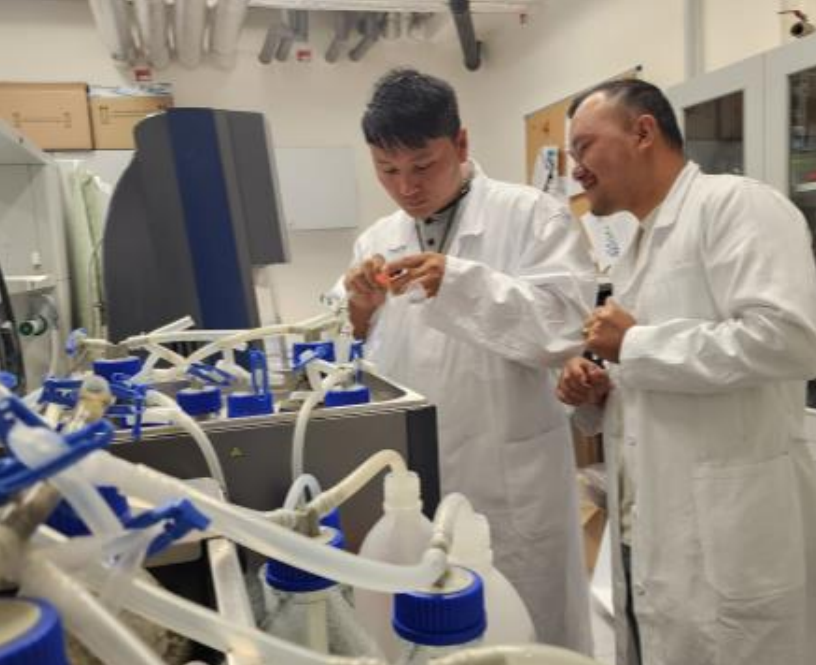Strengthening International Collaboration in Renewable Energy: BRT Hosts Colleagues from Bhutan
The BioResources & Technology Division (BRT) at the Faculty of Tropical AgriSciences (FTZ), Czech University of Life Sciences Prague (CZU), had the pleasure of hosting Mr. Thinley Tobgay from the Department of Electrical and Electronics Engineering and Mr. Dorji Wangchuk from the Department of Civil and Surveying Engineering, both of Jigme Namgyel Engineering College (JNEC), Royal University of Bhutan. The visit was part of the Erasmus+ KA171 faculty mobility programme, aimed at fostering academic collaboration and advancing sustainable technologies.
Bridging Knowledge through Biogas and Composting
Throughout the visit, our colleagues from Bhutan engaged in a series of theoretical and practical sessions focused on anaerobic digestion, composting, and solar energy technologies. The programme was designed to facilitate hands-on learning and exchange of expertise between institutions committed to renewable energy development.
In our laboratories, the participants gained exposure to research methodologies related to the anaerobic digestion of organic materials, including batch testing in experimental biogas reactors. They also participated in a range of practical exercises, including gas measurement and analysis techniques. A key component of their internship was consultation with BRT experts on biogas system start-up, monitoring, and troubleshooting - crucial aspects for developing reliable systems in real-world contexts.
Specialised discussions with BRT members PhD student Antoine Bercy and Postdoctoral researcher and head of BRT lab Dr. Viktoriia Chubur further deepened the guests’ understanding of operational biogas process optimization. While lectures on composting fundamentals and site management were complemented by visits to active composting sites showcasing methods such as windrow composting and vermicomposting. Experiments evaluating compost impact on seed germination and plant growth added a practical layer to the learning experience.
Exploring Solar Energy for Biogas Enhancement
Recognising the interconnectedness of renewable systems, the programme also included sessions on solar energy applications. Particular attention was given to solar thermal systems that can support biogas processes by maintaining optimal temperatures. Discussions focused on their feasibility and adaptability in Bhutan’s climatic and infrastructural context, especially within biogas installations.
Impact at JNEC: From Knowledge to Implementation
The knowledge and experience gained through the mobility are already translating into tangible actions at JNEC. Key outcomes include:
-
Revival of the JNEC Biogas Reactor: The team is applying new skills to test and troubleshoot a large-scale biogas reactor that had been dormant for over nine months.
-
Solar Water Heating Integration: Plans are in motion to implement a solar thermal system to sustain biogas reactor temperature and performance.
-
Establishment of a Biogas Research Lab: Inspired by the facilities and research culture at BRT, JNEC is setting up a foundational biogas research laboratory to support both experimental work and student involvement.
These developments mark a significant step toward enhancing renewable energy education and research capabilities in Bhutan.
Acknowledgements
We would like to express our deepest gratitude to the BioResources & Technology Division (BRT) at the Faculty of Tropical AgriSciences, Czech University of Life Sciences Prague (CZU), for their warm hospitality, exceptional guidance, and the opportunity to engage in such a meaningful academic and professional exchange.
Our sincere thanks go to Assoc. Prof. Dr. Hynek Roubík for his leadership and support, and to Dr. Libuška Mercl and Dr. Viktoriia Chubur for their dedicated mentorship, insightful discussions, and encouragement throughout the programme. We are especially grateful to Antoine Bercy and the entire BRT team for generously sharing their expertise and allowing us hands-on access to state-of-the-art biogas and composting research facilities.
Together, we continue to advance knowledge and action for a more sustainable and energy-resilient future.
The mobility was supported by the Erasmus+ KA171 programme funding.
For more details on BRT activities, subscribe to our newsletter or follow us on social media for regular updates and highlights!


